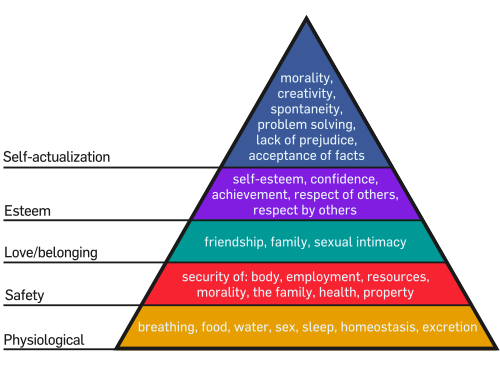This weekend my car broke down, and I dropped my (almost) new phone face down on the ground.
My car had to be towed to a workshop, and my phone now has two huge cracks plus multiple scratches across the screen.
It’s funny, because all this happened as I was writing this article about how to NOT be materialistic.
The reason for writing this? Because I think I have an uncommon non-attachment to material things. But maybe the universe wanted to test me — and see if I would really feel so smug after some of my things got broken.
I admit — it hurt. Financially and emotionally. But it also made me think about how I would have reacted five years ago in the same situation: I would have lost it. It would have made me terribly upset. I’m not 100% detached from my material possessions today, but I’ve come a long way.
So if you think being materialistic is a bad thing. Or you just want to lose some of your obsession with material things, here are some tips I’ve discovered along the way. Hopefully they’ll help you be even cooler than me the next time your car breaks down and your phone gets smashed.
1. Understand the Difference Between Materialism and Comfort
First of all, there’s nothing wrong with wanting a comfortable living.
If you’ve ever studied Maslow’s hierarchy of needs, you know that basic needs have priority over “higher” needs like self-actualization.
Put simply, if you’re homeless, hungry and undersexed, you probably don’t care about “finding your higher purpose”. You want to fulfill your biological needs first.
And in today’s society, that means you need some money and things.
Bill Gates once told a story about a moment that changed his views on philanthropy. At that time, he was trying to bring a cool computer to poor areas in Africa. But then, he visited a hospital where poor kids were dying of tuberculosis. So Bill Gates logically asked himself — how would computers help these kids, if they weren’t even in basic good health?
In the same way, if you’re struggling on a daily basis, it’s hard to not think about material stuff. It’s hard not to think about a car, if you have to walk under the hot sun for hours every day.
 Maslow: You need to fill your stomach before you worry about other stuff
Maslow: You need to fill your stomach before you worry about other stuff
But what’s the boundary between just fulfilling needs, and becoming materialistic?
My definition: materialism is desiring excessive quantities of luxury. And having an unhealthy attachment to things.
I think everyone needs a safe home to stay in. I think everyone needs comfortable clothes to wear. But I don’t think anyone needs to have new shoes to wear every day.
Of course, “needs” are subject to personal opinion too. Maybe you need designer shoes that match all secondary colors in the color wheel… Just understand that if what you “need” is way out of whack with what most people have — you’re probably materialistic.
It’s important to know the difference between materialism and comfort — because first of all you don’t want the guilt of thinking you’re materialistic — if all you’re doing is fulfilling your basic needs.
And secondly, you’ll know to pull yourself back when you cross the materialistic border.
2. Find Your Purpose
I think people who are overly-materialistic have voids in their lives.
Specifically voids that should be filled with love and purpose.
“Wait — you mean my purpose on earth is not to accumulate a lot of nice things and show off on Instagram?”
Yes.
Because research has shown again and again — things don’t make people happy. Love does.
Some people believe their purpose on earth is to prepare themselves for heaven. That’s great — as long as they don’t go kill people who disagree with them.
It doesn’t even have to be a huge, charitable purpose like Bill Gates’.
Maybe your goal in life is just to raise your kids in the best possible way. So they grow up to be good people. That’s great too.
The stronger your purpose in life is, the less you selfishly worry about material things.
Five years ago, all I thought about was making more money to buy more stuff and “raise” my status. But nowadays, I find my purpose in writing. I just take care of my basic needs first (refer point 1 above), and then all my excess energy goes to trying to make my website the best I can. I don’t have “mental space” to desire things anymore.
And I’ve realized that status isn’t found in the things you own, but in the type of person you are.
3. Give
The first two points above aren’t very easily actionable. You actually have to think…
But this one is. This one is a clear, concrete way to lessen attachment to material things:
Give. Give away your old stuff. Give gifts to make people happy. Give money to those in need.
First of all, it’ll help you realize that you actually don’t need very much. If you’re like most people, most of the stuff you own is hardly utilized anyway, right? Secondly, you’ll realize that you can actually live on less of your income — you just need some discipline. And most importantly, it will absolutely make you happier.
My mom taught me to give since I was a kid. Fixed portions of whatever income I get every month. I’m not saying this to brag, but it’s gone a huge ways to making me less attached to things.
If this sounds impractical, let me assure you I understand how powerful money is. And how important things are for comfortable living. Especially if you have dependents.
But money and things aren’t meant to occupy our minds. They’re just tools for us to lead better lives. Practicing giving helps put things into perspective.
Because I want you to believe that life isn’t about being selfish. It’s not just about you. Or me. There’s a higher purpose for all of us. And there’s a Higher Being who won’t ignore your contributions to the world.
The original version of this article first appeared at Emmagem
Pic Credit: Ed Gregory at Stokpic, By User:Factoryjoe at Wikimedia




Hey,
Love the article, especially the part about giving. It feels great to see an article that goes against popular culture and actually talks about not being materialistic, rather than “Top Ten Ways to make a $1 Million. I find it really fascinating when people have this change in mindset, and I would love to know more about the experiences or moments that led you to think differently.
Keep up the good work 🙂
Hi Palaash,
Thanks for your kind words and support! I think there’s a lot of scientific evidence that conventional materialistic culture (e.g. buying a lot of stuff) doesn’t make anyone happier. For me, there wasn’t any one particular transformational moment — but I read a lot of material online and spend a lot of time alone thinking. (Yes, I’m an introvert). And it’s gone on for years. So it’s been a gradual process of learning, examining my own life, and seeing what makes me happy. (Yeah, kinda boring I know — but I never went through a dramatic “Oh shit my life is ending I better turn it around right now!” moment)
I’m still learning of course, and obviously don’t have all the answers. But the more years I spend on this earth, the more I agree with what both modern and ancient writers/thinkers have been saying for a long time… At this moment I can happily agree (both from knowledge and experience) that materialism doesn’t make people happier.
It’s love and meaning that do.
Totally get it.
One of the other way (which would be the subset of finding the purpose) that works for me is relentlessly asking ‘why’.
We’ll be deliberate and intentional.
For instance, behind the needs (or wants) for money to buy stuffs, investigating what that stuffs would meant to me will reveal whether it is superficial (which would almost always lead to never ending nihilistic journey) or as a mean to get greater valuable things in life.
Case in point, an (almost) new phone is essential for human connection.
Ah well, cheers for minimalism.
Well said Ilham… questioning the motives in everything we do… Fully believe in that!